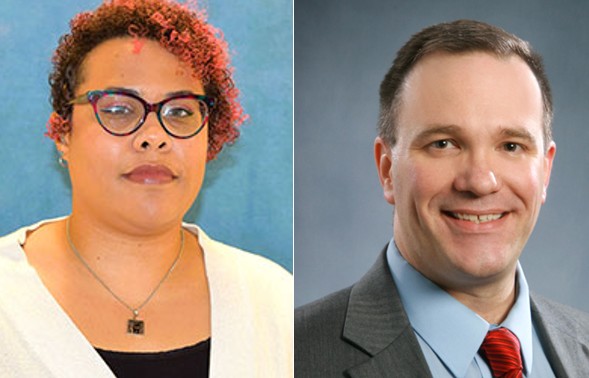New Lakeland Lecture to center on Modern Workplace Learning
On Thursday, May 29, 7pm, Lakeland University Japan (LUJ) will continue its Lakeland Lecture series (ongoing since 2008) with a talk titled "Culture, Cost, and Credibility: Rethinking Learning in the Modern Workplace." The two speakers, Dr. Katie Harrington and Dr. Drian Glyde are professors from LUJ's partner school, Virginia Wesleyan University (VWU). Dr. Harrington teaches Psychology while Dr. Glyde is a part of VWU's Department of Management, Business, & Economics and teaches various courses, such as accounting, finance, and operations.
For more information about the lecture, please check out the poster image below.
Before their lecture, we caught up with the two professors. both of whom will be at LUJ for most of the summer semester.
Dr. Harrington...it's hinted at in the lecture description, but what are a few of the learning initiatives you'll be highlighting in your half of the lecture?
Dr. Harrington: Although I will be discussing types and methods of funding continuing education...I am hoping to give a broader overview of what continuing workplace/workforce education entails. I will be briefly discussing international differences in the availability and accessibility of funding for workplace/workforce education.
For Dr. Glyde, what are a few practical examples of structured ethics instruction in a company setting?
Dr. Glyde: One of the challenges with ethics training in a corporate setting is that it is often viewed as informing staff how to tell the difference between right and wrong from the company's viewpoint. The issue with this is that the company does not acknowledge that ethical dilemmas often involve choosing between two 'rights' or the individual nature of ethical decision-making. On an organizational level there is usually a failure to understand that a workplace culture that supports positive ethical decision-making is also a culture that promotes openness, creativity, innovation, change, and growth.
What does that mean from a structural standpoint? Companies should engage in ethics training that relates directly to specific job roles (this should include every level of employee and executive), and have staff practice solving ethical dilemmas (think of this like wargaming). You get better at what you prepare for. This should also be repeated on a yearly basis. In addition, an organization should examine procedures and policies for conflicts that create ethical dilemmas and revise them to minimize that possibility.
Is this your first time visiting Japan? Could you perhaps both tell us about other experiences you've had living abroad?
Dr. Harrington: This is my second time travelling abroad beyond a few care trips to Canada during my undergrad, and it is my first time travelling abroad in 25 years. I have not had experience living outside of the United States prior to this trip for any length of time. When I last travelled, I was a student on a study abroad trip, myself, though in middle school as opposed to university.
Dr. Glyde: Yes, this is my first time visiting Japan. I have traveled a fair bit internationally, but mainly in Europe. I am excited to be here and have this experience. I expect to learn more than I teach the students!
I have not lived abroad much. I lived in the UK for one year in 1984. I was a teenager then, so I was not pleased with my parents for taking me away from my friends at that time. Fast-forward to today, and I very much appreciate the experience I had. It ended up being a great time of self-discovery outside my everyday life in the U.S. and an opportunity to learn a lot about how different cultures relate, how people are the same on a certain level, and also the nuances of difference. Little did I know that experience would help in college, help my career, and help me find a level of confidence that has made a big difference.
Most of the audience will be college students in their twenties and early thirties. What were your college years like? Did some of the experiences prepare you for where you are today in your career?
Dr. Harrington: I had a rather lengthy and unusually timed college career, but I also purposely pursued an education with the goal of it being necessary for my chosen career. I don't want to have not answered your question (and maybe this viewpoint comes from being a teacher raised by teachers), but I think every experience I had in college has been useful to some extent in preparing me for my current career.
Dr. Glyde: My college journey spanned decades, and each phase's experiences helped me in different ways. I received my B.S. in Ceramic Engineering in 1993. While I did not go into engineering specifically, I did use my math and design skills in the construction industry. Later in my career, after I got my MBA with finance and HR concentrations, the engineering degree was also very helpful when I was hired as an executive by a piezoelectric manufacturing company. I was the only business executive who had a background in what our company did. All of that led me to pursue my Doctorate in Business Management, focusing on Organizational Development and Change. The doctoral experience pulled together my broad background, practical experience, research interests, and, naturally, supported my career as a consultant and academic. So, each college experience contributed to my career journey in essential ways.
Follow LUJ on Instagram
Follow VWU on Instagram
